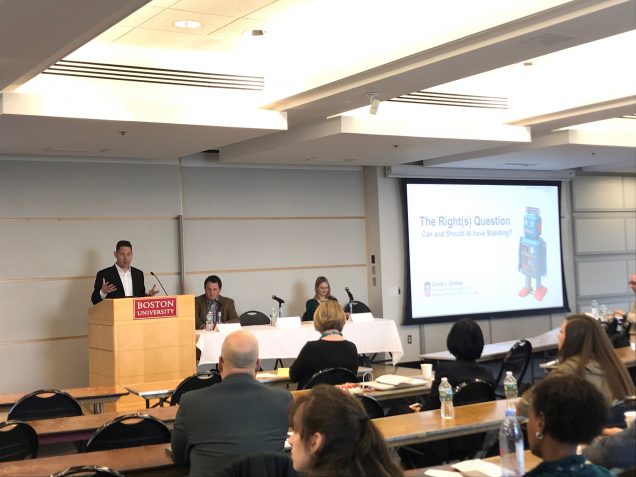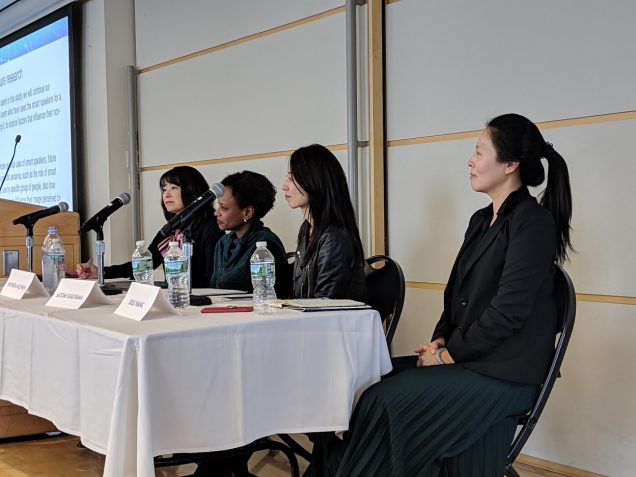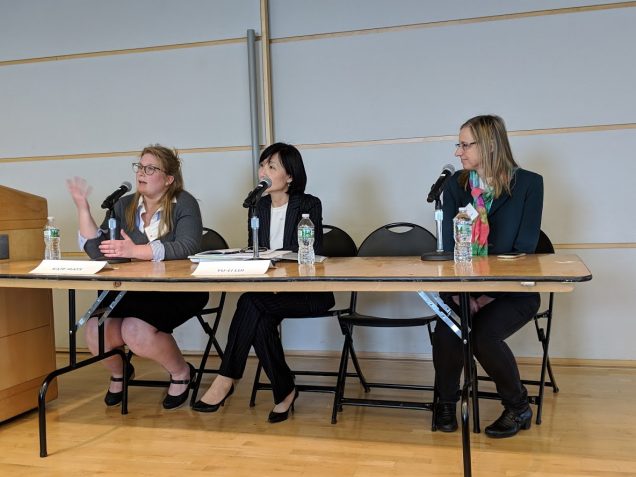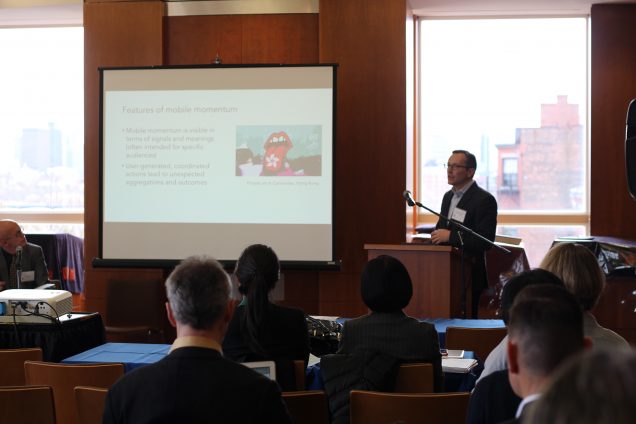Spring 2019 Symposia: Human Community and Perpetual Contact / Should Robots Be Our Friends?
Scenes from the Symposia
April 10th: Human Community and Perpetual Contact in an Era of Artificial Intelligence
This Invitational Expert Panel on April 10th investigates the future of perpetual contact from a humanities, philosophical and social scientific perspective. Questions include: How does the increased prevalence of algorithmically-informed communication technologies influence us as humans? How do we share and receive information in the smart home? What are the implications for social and domestic relationships? What role should philosophy and other humanistic disciplines play in understanding these phenomena? Expert scholars will contribute to a lively discussion, interrogating implications of our current algorithmic culture.
International Scientific Advisory Board*
- Arruda Filho, Emilio (University of Amazon)
- Betke, Margrit (Boston University)
- Bucy, Erik (Texas Tech University)
- de Souza e Silva, Adriana (North Carolina State University)
- Floyd, Juliet (Boston University)
- Liu, Yu-li (National Chengchi University)
- Neff, Gina (Oxford University)
- Redman, Philip (Accenture)
- Serrano Tellería, Ana (Universidad de Castilla-La Mancha)
- Soysal, Zeynep (University of Rochester)
- Takahashi, Toshie (Waseda University, Tokyo)
- Tian, Li (Peking University)
- Wild, Claude (Organization for Security and Co-operation in Europe)
- Xie, Xinzhou (Peking University)
*Institutional affiliation presented for identification purposes only and does not imply endorsement
April 11th: Should Robots Be Our Friends? Ethical and social scientific implications of the growing emotional engagement of humans with AI agents and robots
Robots and other artificial intelligence (AI) entities have long tempted people to treat them as if they were alive, human-like, or even had souls (Katz, 2003). This topic is now front and center as people increasingly welcome AI and robots into their lives as conversational partners, servants, and companions. More, the concept of artificial intelligence has served as a catalyst for artists, philosophers, mathematicians, and psychologists to examine the defining characteristics of consciousness and what it means to be human, such as Hobbes (1651), Turing (1950), and Searle (1980).
Today, much of what was initially conceptualized as fiction has materialized as a technological reality. As artificial technologies become more increasingly prevalent in contemporary life, it is necessary for researchers to examine the potential implications with regard to ethics (Anderson & Anderson, 2012; Lin, Abney, & Bekey, 2014; Taddeo & Floridi, 2018), identity and social relationships (Breazeal, 1999, 2003, 2004; Turkle, 1995) sex and love (Levy, 2007; Sullins, 2012), education and development (Resnick, 1998; Kahn et al. 2012) and labor and economy (Boyd & Holton, 2017; Crawford & Joler, 2018).
In order to more fully understand the complexities of AI and its social consequences, the Division of Emerging Media Studies at Boston University presents an international symposium, where scholars from a variety of fields will discuss the promises and perils. An interdisciplinary, cross-cutting approach will help to facilitate an in-depth examination of the topic through paper presentations, panel discussions, and a poster session. The symposium will encourage the audience to participate actively with questions and debate. We will also try to showcase some of the latest technology.
The goal of the event is for participants to not only develop an enhanced understanding of the competing issues at play but also identify actionable next steps within their fields of study. Finally, the social psychological and ethical dimensions will be delineated in pursuit of a greater understanding of the nettlesome issues that we as a society will be facing.
Reference
- Anderson, M. & Anderson, S. L. (Eds.). (2011). Machine ethics. Cambridge, UK: Cambridge University Press.
- Boyd, R., & Holton, R. J. (2017). Technology, innovation, employment and power: Does robotics and artificial intelligence really mean social transformation? Journal of Sociology, 54(3), 331-345.
- Breazeal, C. (2003). Emotion and sociable humanoid robots. International Journal of Human-Computer Studies, 59(1-2), 119-155.
- Breazeal, C. L. (2004). Designing sociable robots. Cambridge, MA: The MIT press.
- Breazeal, C. (1999). Robot in society: Friend or appliance. In Proceedings of the 1999 Autonomous Agents Workshop on Emotion-Based Agent Architectures (pp. 18-26).
- Crawford, K. & Joler, V. (2018 September 17). Anatomy of an AI system: The Amazon Echo as an anatomical map of human labor, data and planetary resources. AI Now Institute and Share Lab. Retrieved from: https://anatomyof.ai
- Hobbes, T. and Gaskin, J. (1998). Leviathan. Oxford, UK: Oxford University Press.
- Kahn Jr, P. H., Kanda, T., Ishiguro, H., Freier, N. G., Severson, R. L., Gill, B. T., … & Shen, S. (2012). “Robovie, you’ll have to go into the closet now”: Children’s social and moral relationships with a humanoid robot. Developmental Psychology, 48(2), 303-314.
- Katz, James E. (Ed.), (2003). Machines that become us: The social context of personal communication technology. Piscataway, NJ: Transaction Publishers.
- Lin, P., Abney, K., & Bekey, G. A. (2014). Robot ethics: the ethical and social implications of robotics. Cambridge, MA: The MIT Press.
- Resnick, M. (1998). Technologies for lifelong kindergarten. Educational Technology Research and Development, 46(4), 43-55.
- Searle, J. R. (1980). Minds, brains, and programs. Behavioral and Brain Sciences,3(3), 417-424.
- Sullins, J. P. (2012). Robots, love and sex: the ethics of building a love machine. IEEE Transactions on Affective Computing, 3(4), 398-409.
- Taddeo, M., & Floridi, L. (2018). How AI can be a force for good. Science, 361(6404), 751-752.
- Turing, A. (1950). Computing machinery and intelligence. Mind, 59(236),.433-460.
- Turkle, S. (1995). Life on the screen. Identity in the age of the internet. New York, NY: Simon & Schuster.
Joint Sponsors
Sponsored by:
- The Feld Family Professorship of Boston University’s College of Communication
Co-Sponsored by:
- Division of Emerging Media Studies, Boston University
- The Consulate General of France in Boston
- Artificial Intelligence Research (AIR) of Boston University
- The Mellon Foundation Sawyer Seminar
We gratefully acknowledge our sponsors.
Schedule of Events
| Time | Session |
|---|---|
| 10:00 – 10:15 | Coffee & Registration |
| 10:15 – 10:30 | Welcoming Remarks from Margrit Betke Greeting from Dean Xinzhou Xie of Peking University, presented by Xiuli Wang Introductory remarks from James Katz |
| 10:30 – 11:35 | Panel 1: Spirit, power and emotions Philipp Stoellger; Colin Agur Satomi Sugiyama, chair |
| 11:35 – 12:30pm | Panel 2: Emerging media and the future of international education András Benedek, György Molnár, Juliet Floyd, Emilio Arruda Lei Guo, chair |
| 12:30 – 1:15 | Lunch |
| 1:15 – 2:25 | Panel 3: Chilean and Swedish perspectives on perpetual contact Alexandra Weilenmann, Sebastian Valenzuela Chris Wells, chair |
| 2:25 – 3:25 | Panel 4: Time and attitudes regarding digital entities Pierre Cassou-Nogues, André Caron Xiuli Wang, chair |
| 3:25 – 3:45 | Coffee Break |
| 3:45 – 4:45 | Panel 5: Public understanding of robots among us Sharon Strover, Bertram Malle Michaël Vallee, chair |
| 4:45 – 5:00 | Summary and Closing Remarks from James Katz |
| 5:00 – 6:00 | Reception |
| Time | Session |
|---|---|
| 10:00 – 10:15 | Coffee & Registration |
| 10:15 – 10:30 | Welcoming Remarks from Dean Thomas Fiedler, BU College of Communication Introductory remarks from James Katz |
| 10:30 – 11:35 | Panel 1: Robots, gender, and affection: Mainland China, Taiwan & USA Yu-li Liu; Kate Mays Margrit Betke, chair |
| 11:35 – 12:35pm | Panel 2: Robotic in daily life and robot rights David Gunkel; Andrea Guzman Phil Redman, chair |
| 12:35 – 1:20 | Lunch |
| 1:20- 2:25 | Panel 3: Everyday robots and friendships: Japan and beyond Toshie Takahashie; Rhonda McEwen; Satomi Sugiyama Juliet Floyd, chair |
| 2:25 – 3:25 | Panel 4: Voice, news and oral traditions Xiuli Wang; Valerie Belair-Gagnon Jacob Groshek, chair |
| 3:25 – 3:45 | Coffee Break |
| 3:45 – 4:45 | Panel 5: Bringing sociology, philosophy and emotions into focus Joachim Höflich, Nick Agar Russell Powell, chair |
| 4:45 – 5:00 | Summary and Closing Remarks from James Katz |
| 5:00 – 6:00 | Reception |
Conference Materials
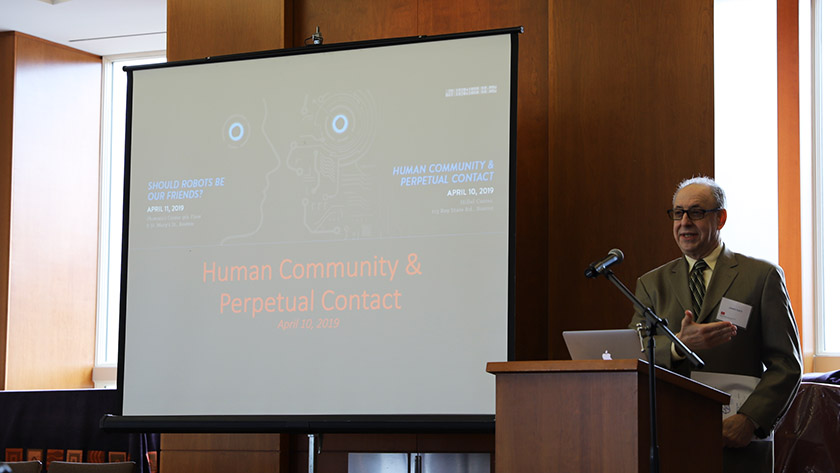
Presentations
- Does an ageing world need a little help from some robot friends?
- Embarrassment and Anticipated Regret as a Psychological Barrier to Consumers’ Evolution in the Digital Era
- Emerging Media and the Future of International Education
- The “Robot Reporter” and the Paradox of Emotion in Journalism
- Robotic Others: Two way interactivity – one way empathy. Emotional traps and social incorporation of robots
- Effects of Personal Traits and Robot Features on People’s Acceptance of Robots: A Comparative Study of Taiwan and Mainland China
- Acceptance and Gender Perceptions of Robots in a U.S. Context
- Things or No-Things: Robots are not just a Thing, not yet a Human
- The Complexity Model of Communication in the AI Age: the case of Japanese Engagement with Artificial Intelligence and Robots in Everyday Life
- Mobile Instant Messaging and the Future of Citizenship
- Selfies in the Wild: Studying selfie photography as a local practice
